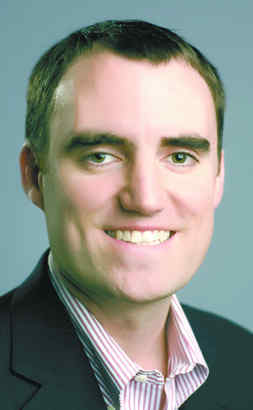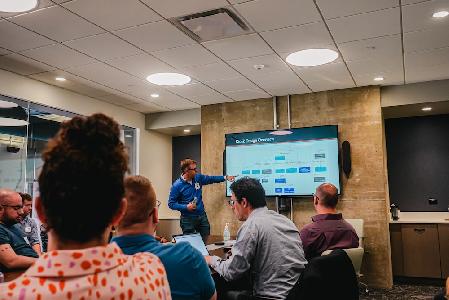He may not live in Philadelphia quite yet, but Philly.com President Ryan Davis says he’s “a southeast Pennsylvanian at heart.”

Of course, in the interest of disclosure, it should be made clear that Davis, who was put in charge of Philadelphia’s most visited Web site in October, lives in New York City, a rival if there ever was one.
The native of Allentown takes a daily train trip to Center City but says he, his wife and their new baby daughter — who he says has delayed the move — will be relocated to the region in the coming months.
If you’d think his location would keep Davis from the gig, the age of this 32-year-old might, too, seem like an obstacle. Yet there at the Market Street Philly.com headquarters he is, and, like every where else he’s gone professionally, he’s gotten there quickly.
Outside of college, Davis has never spent as much as three years with a single organization during his precipitous rise from aspiring journalist to newspaper dot com chief executive.
After graduating from Northwestern University’s Medill School of Journalism in 2000, Davis spent 29 months reporting with the St. Petersburg Times and then two years and nine months at the Baltimore Sun. He spent two years in Manhattan with executive management consulting firm McKinsey before taking the director of strategic operations position with Philly.com in February. Nine months later, he was named president of the 70-person staff.
That rise, he says, has put him where he wants to be when he wants to be there.
“It’s an exciting time when a lot of people are trying to figure out what local means on the Internet,” he says.
Below, Davis explains living in New York, lays out his priorities for improving on 72 million monthly page views and talks about the coming explosion of local on the Web.
Edited for length and clarity.
Why the Manhattan home address?
Brian [Tierney, chief executive of Philadelphia Media Holdings, which owns and operates Philly.com, the Inquirer and Daily News] hired me and my wife was already pregnant. She had an OBGYN in New York, she was already starting that process.
Anyone who has been in this situation knows that you can’t just pick up and leave. I’m willing to commute for now, but now that our daughter was born in August we plan to relocate in the area in the next few months.
My wife went to high school in the Newton Square area… and moving to Philadelphia is an option — we have some friends who are lobbying pretty hard for that. Wherever it is, we’ll be here permanently soon, and I already spend a lot of time here now.

Does having a leading executive live in New York conflict with PMH’s ‘Keep it Local’ initiative?
[laughs] Well, I’m a local guy. So no.
What was the first step you made after being named president in October?
The first step is setting the priorities of those other steps. I’ve tried to come in much like a consultant would. We’re ripe with opportunities, but if we tried to do 5,000 things, we would not do those 5,000 things well. We can, though, if we choose the right five or 10 things.
So what are some examples of your top priorities?
They run across different realms. I was involved in continuing the sports build out of our site. We’re continuing the growth and development of that. We produce more sports content than anyone around, so we need to find ways to get users to enjoy and use that.
Another priority is to continue to find unique opportunities for advertisers. We are part of the company and working very closely with the Philadelphia Daily News and Philadelphia Inquirer. The Daily News is, I think, now 85 years old, and the Inquirer will celebrate 181 years next year. That means a lot with the advertisers, but we haven’t shown the real value of connecting online in addition to print.
A third and larger priority is that we’re looking very closely at the look and functionality of Philly.com. We had a redesign a year and a half ago. Since then, we’ve learned a lot of how people interact with the site. In some ways we’re knocking it out of park and other ways not so much.
Are you suggesting we could see a Philly.com redesign in 2010?
No, well, I don’t think we do a great job of making users find all that great content we create. So I want to see tweaks to the navigation without redesigning the site. To me, redesign means tearing everything down and starting over. We don’t need to do that. We can learn lessons from, say, what we did with our sports section and bring some of those subtle changes.
How are the bankruptcy proceedings affecting Philly.com?
It really isn’t. The bankruptcy has a lot to do with the financial side of things. Everything that we’re talking about here is with the operational. It doesn’t change how we approach what we’re doing. It doesn’t change smart investments. Any vendors we deal with, I think, would tell you that. Someone might not even know we’re even dealing with bankruptcy.
We’ve seen a lot of big brands — like the Huffington Post and ESPN — enter local markets to directly compete with newspapers. Do you have any thoughts on why Philadelphia hasn’t been mentioned, and does your strategy relate to the possibility of other big online brands coming to town?
Fifteen years ago, if you asked the Inquirer, the competition was the Camden paper, the Chester paper or the West Chester paper. Maybe 30 years ago, it would have been the Bulletin.
If you ask now, gosh, we have a lot of competitors in a lot of places. Some of them we can do deals with, some we can partner with. Really though, competition is good for everyone. It makes us do our jobs better.
Still, I can’t spend a lot time wondering why other people choose the markets they choose. Our strategy has formed in a lot of ways for a lot of different reasons. So, yes, one input is what your competitors are doing, with sports in particular. We’ll just stay aware and see if we can partner.
In your role, you’ll also be leading an outreach effort led by an advisory board of venture capitalists and outside business professionals. Is there real entrepreneurship on the Web, particularly with media, in Philadelphia?
I think there are a lot of people doing a lot of interesting things. I don’t think anyone brings to the table what we bring to the table, though. You just look at the content engines we’ve got: the newsrooms of these two giants, the Inquirer and the Daily News. They’re in every locker room, attending every government meeting, offering daily updates on Roy Halladay and his agent being in town.
It’s the same people who bring, in paper and online, the huge coverage on the troubles with the Philadelphia court system. Everyone can be a publisher, but you look at the sheer numbers of what we’re doing and you know what sets you apart.
What are you first: a journalist, an editor, a Web entrepreneur, an executive or something else?
This is a business. I spend my day on, generically speaking, making business decisions. I once thought there was a world for people who understood journalism and understood business. I’m proud that, I struggle to say ‘I was,’ because I think I still am a journalist. I’m in this leadership position, but I have an editor who handles the content [Wendy Warren] and someone who runs ad sales [Dan Sarko Kevin Stetter]. The biggest thing I do is bring this understanding of both and putting together the business plan that goes with it.
I’m a business person who understands very well what we do well here.
Does the Comcast deal to acquire a majority stake in NBC Universal interest you?
I care about it because it’s interesting and because Comcast has a lot of smart people and I want to see what they do, but nothing directly affects us. I eagerly wait what they do, but there’s no change to our strategy. They could certainly do a lot of things, so we’ll have to keep our eye on them.
A lot of dialogue in media today revolves around the sustainability of standard online advertising as a primary revenue platform. What ways do you hope to see Philly.com innovate around monetization?
We certainly offer a lot of opportunities to our advertisers, We will have an increasing video offering, and people are seeing that video advertising is a real viable option. We need to offer great creative on display, not just that sit on the page but interact with readers, while being both helpful to the reader and cautious of reader experience.
We’re always thinking about how we can help different advertisers. Maybe it’s data collection with registered users and IP addresses.
There’s nothing I want to see more than a story I want to read and an ad that has value to me. That’s the perfect page on the Web.
What is the relationship you see Philly.com having with the Inquirer and Daily News going forward?
Most of our content comes from those newsrooms. There are a lot of Web sites that wish they had their content coming from there, as opposed from those who are commenting on the news that other people write.
You’ve seen that shift from when our content was once just what appeared in the newspaper, and now reporters are blogging and now increasing that material in real time and going on video to tell you more. We’ll continue to do that. We’re one company. We’re not just a newspaper Web site. We’re a Web site that is fueled by newspapers.
Look at the Mob Scene videos. That is [famed Inquirer organized crime reporter] George Anastasia who everyone knows, but doing something different than what he ever did before, and that’s something our reporters will continue to do. The printed product is valuable to hundreds of thousands of people, but the online product is important as well.
Give us two predictions for 2010: one for the media landscape generally and one for Philly.com specifically.
2010 will be the year where you get tired of hearing local on the Internet. Everyone will be talking about how you get to reach local communities on the Internet. It will be the year of local on the Internet. Enough people have been trying to crack that nut for years, and a lot of people are trying to get in the spot we’re in. So, ‘local internet’ will be phrase of the year.
My prediction for Philly.com will be for another year of big growth, both in people who use the site and people who find a better and better experience and in advertisers who see the results.
Every Friday, Technically Philly brings you an interview with a leader or innovator in Philadelphia’s technology community. See others here.
Join the conversation!
Find news, events, jobs and people who share your interests on Technical.ly's open community Slack

Philly daily roundup: Student-made college cost app; Central High is robotics world champ; Internet subsidy expiration looms

Philly daily roundup: Earth Day glossary; Gen AI's energy cost; Biotech incubator in Horsham

Philly daily roundup: Women's health startup wins pitch; $204M for internet access; 'GamingWalls' for sports venues

